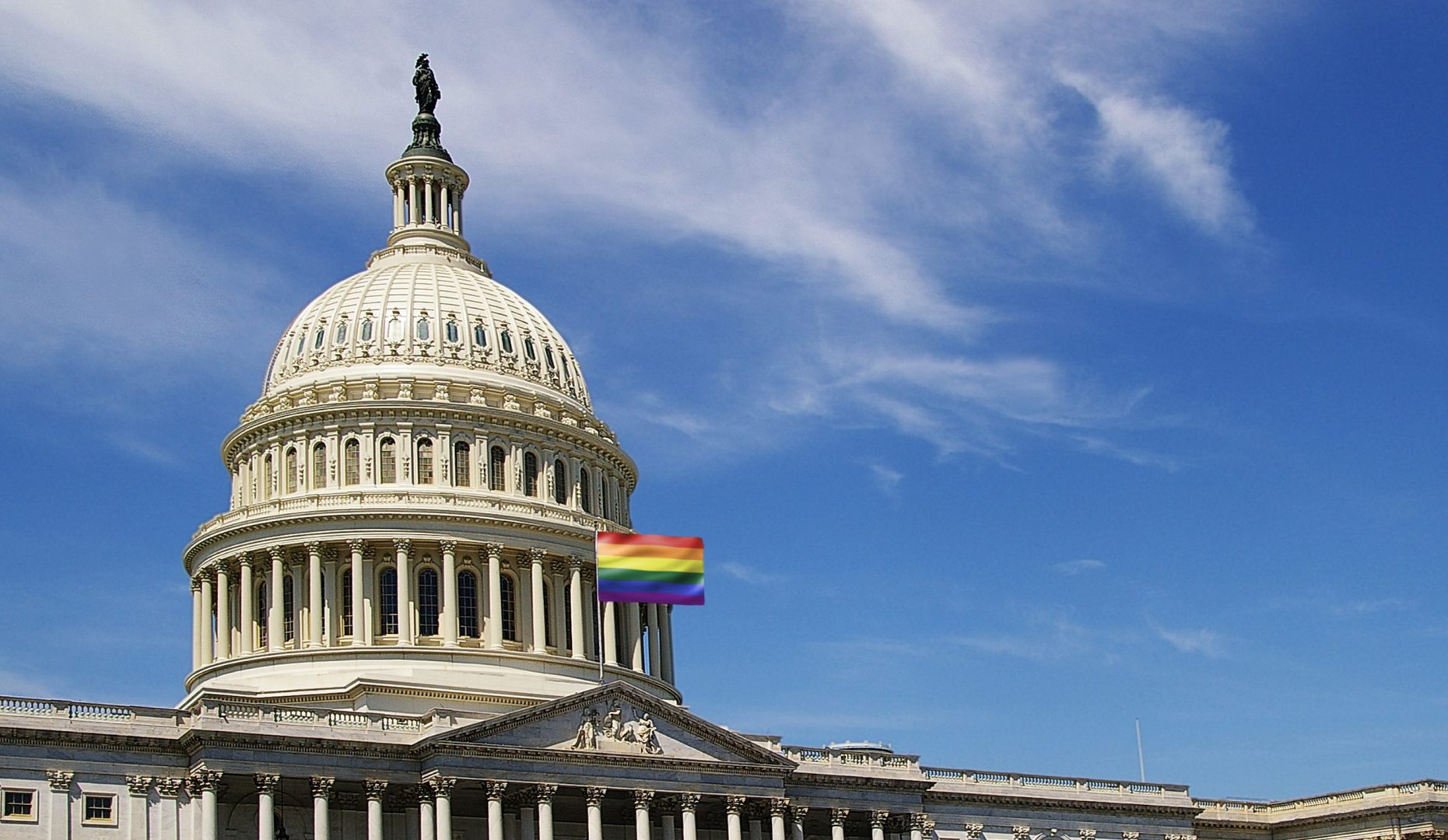


Get a free copy of Parental Rights & Education when you subscribe to our newsletter!

What is the expressed purpose of the Respect for Marriage Act?
Why is Congress so enthusiastic about passing this law now?
What is the current status of the RFMA now and what happens next?
What is the RFMA’s impact on religious freedom?
The RFMA has one single priority, with a few subliminal (though concerning) priorities behind it. The intent of the RFMA is to enshrine a national right to same-sex marriage. As is stated in the bill’s most recent text, the purpose is “To repeal the Defense of Marriage Act and ensure respect for State regulation of marriage, and for other purposes.”
It’s important to note a brief summary of the Defense of Marriage Act (DOMA) for proper context to the RFMA. DOMA was signed into law by President Bill Clinton and received support from nearly a third of both the House and Senate’s Democrat caucuses. DOMA had two primary sections: “Powers Reserved to the States,” which authorized states to deny same-sex marriage recognition, and “Definition of Marriage,” which defined marriage as a union between one man and one woman as it pertains to federal purposes such as taxes, benefits, etc. But since DOMAs enaction in 1996, both of these sections, which effectively made up the entirety of the law, were struck down by two different landmark Supreme Court cases. In 2013, the Court ruled in United States v. Windsor to repeal the “Definition of Marriage,” and in 2015, the Court ruled in Obergefell v. Hodges to repeal the “Powers Reserved to the States.” The Obergefell decision rendered same-sex marriage legal across all 50 states.
As it currently stands, DOMA is still a law on the books but is void of effective substance and remains in title only. The purpose of repealing DOMA is to ensure that, in the event that the Supreme Court overturns Windsor or Obergefell, DOMA won’t become active again.
While there are several speculations as to the timing of this push, such as the midterm elections, the most concrete factor is that the proven conservative majority on the Supreme Court has many people concerned that marriage-equality cases may be reversed, namely Windsor and Obergefell. The fear behind Windsor and Obergefell being overturned comes from a line by Justice Clarence Thomas in his opinion in Dobbs v. Jackson Women’s Health, the case that reversed Roe v. Wade last June 24. Thomas postulated the idea that the Court should revisit cases dealing with “substantive due process,” which was a factor in Roe and Roe’s affirming case in 1992, Planned Parenthood v. Casey.
Substantive Due Process was also a factor in Windsor and Obergefell.
Thomas said,
“As I have previously explained, substantive due process is an oxymoron that lacks any basis in the Constitution.” Thomas went on to say that the Court “should reconsider all
of this Court’s substantive due process precedents, including Griswold, Lawrence, and Obergefell. Because any substantive due process decision is demonstrably erroneous.”
Supporters of marriage equality are right to be concerned about the Court’s conservative jurisprudence. While the Dobbs decision was the biggest case of the season, the Court also ruled conservatively in a 2nd Amendment Case and a free speech case in the same term.
Despite the Senate voting twice with the percentage needed to invoke culture, there is still potentially one more procedural vote before the Senate votes to pass the bill. At this point, it seems likely the Senate will pass the bill unless the 12 GOP senators and one Democrat change their minds. Since cloture has already been invoked, the filibuster is not an option and a simple majority (51 votes) is needed. With a split senate, Vice President Kamala Harris gets the tie-breaking vote. From there, the bill will return to the House of Representatives for a re-vote. The House passed the bill originally but the senate’s alterations were significant enough for the House to review and revote. Assuming House passage, it will go to President Joe Biden’s desk for signature.
Effectively, the RFMA would not impact marriage equality in America but would install a means to prevent repealing current marriage equality rights. The major impact of the RFMA sits not with marriage, but with religious liberty.
Opponents of the RFMA, or the “Destruction of Marriage Act” as William Wolfe quipped, have strongly noted the bill’s lack of protection for religious people who, for example, may wish to not provide services in support of a same-sex wedding ceremony. While the bill has language that pertains to religious liberty protections, many have called the legislative language “lip service” used to garner enough votes to pass cloture (60 votes) which is first required to proceed to a vote for passage. To the common citizen, the language might appear to have more than a sufficient intent to protect religious liberties, but experts like Senator James Lankford have reason to doubt the legitimacy of these protections, saying, “we don’t deal with intent here in Congress, we deal with legislation and text. The words matter in this.”
For a strong and winsome analysis of the ramifications on religious liberty, watch Senator James Lankford’s delivery here:
Section 6 of the RFMA, “No Impact On Religious Liberty and Conscience” reads,
“Nothing in this Act, or any amendment made by this Act, shall be construed to diminish or abrogate a religious liberty or conscience protection otherwise available to an individual or organization under the Constitution of the United States or Federal law.
Consistent with the First Amendment to the Constitution, nonprofit religious organizations, including churches, mosques, synagogues, temples, nondenominational ministries, interdenominational and ecumenical organizations, mission organizations, faith-based social agencies, religious educational institutions, and nonprofit entities whose principal purpose is the study, practice, or advancement of religion, and any employee of such an organization, shall not be required to provide services, accommodations, advantages, facilities, goods, or privileges for the solemnization or celebration of a marriage. Any refusal under this subsection to provide such services, accommodations, advantages, facilities, goods, or privileges shall not create any civil claim or cause of action.”
As was noted before, the language here suggests that religious freedom should be of no concern. However, as Lankford has pointed out, the long list of alleged protections does not protect the individual citizen from being sued for refusal to participate in an activity that violates their religious convictions. Nowhere in the text is there protection for individual citizens or business owners. And it is no conspiracy to assume that private business owners will be targeted with this bill as law. Roger Severino provides another great analysis of the vulnerability of religious freedom here.
It is reasonable to assume that private business owners will have their religious freedom targeted. One would only need to remember Jack Phillips, Barronelle Stutzman, Coach Kennedy, Emily Carpenter, Joanna Duka, Breanna Koski, and several other business owners who have fallen into the same bullying crosshairs that the citizenry of America will continue to be subjected to with this law in place.
It’s worth harkening back to two heralding opinion excerpts from Obergefell v. Hodges. When the Court ruled 5-4 that gay marriage will now be legal in all 50 states, the notion that religious liberty may be targeted was presented by two justices: Justice Alito, who ruled in the minority, and Justice Kennedy, who ruled in the majority. Despite their varying positions, both saw it necessary to address the idea that legalizing gay marriage may compromise religious freedom.
Delivering the Opinion of the Court, Kennedy said,
“Finally, it must be emphasized that religions, and those who adhere to religious doctrines, may continue to advocate with utmost, sincere conviction that, by divine precepts, same-sex marriage should not be condoned. The First Amendment ensures that religious organizations and persons are given proper protection as they seek to teach the principles that are so fulfilling and so central to their lives and faiths, and to their own deep aspirations to continue the family structure they have long revered.”
While Kennedy’s opinion did not directly suggest that anybody would be targeted, the fact that he felt it necessary to give a proactive defense says something. Despite Kennedy’s sentiment, this is not at all how things played out.
Alito warned,
“The decision will also have other important consequences. It will be used to vilify Americans who are unwilling to assent to the new orthodoxy.”
Since the 2015 ruling, several religious liberty cases dealing with same-sex marriage have accosted citizens with sincerely held religious beliefs, as Alito warned. He concluded,
“Most Americans—understandably—will cheer or lament today’s decision because of their views on the issue of same-sex marriage. But all Americans, whatever their thinking on that issue, should worry about what the majority’s claim of power portends.”
This bill would only serve to advance the agenda of anti-religious liberty bigotry while attacking those who were living their lives as normal citizens in a non-hateful, non-oppressive manner. There are two major remedies for this type of tyranny: prayer and voting. Several stories throughout the Bible show God-fearing people taking action to combat injustice. God won’t call everyone to vocational politics, but that doesn’t dismiss our responsibility to vote and take what action we can to slow the spread of evil in our policy fields.
All of the effort being pushed in Washington D.C. by committed faithful believers is severely undermined when the Church doesn’t vote. Policies are advanced by lawmakers, thus all efforts that go into creating and sending policies to the advancing offices are null and ineffective if the legislator of such office doesn’t stand for righteousness.
Stand righteously. Stand faithfully.
For more material on Christian influence in the political realm, check out our Theology of Politics series.
Christian conservative news and issues that matter. Curated just for you!

